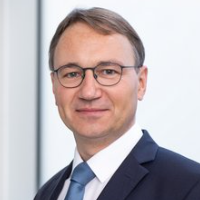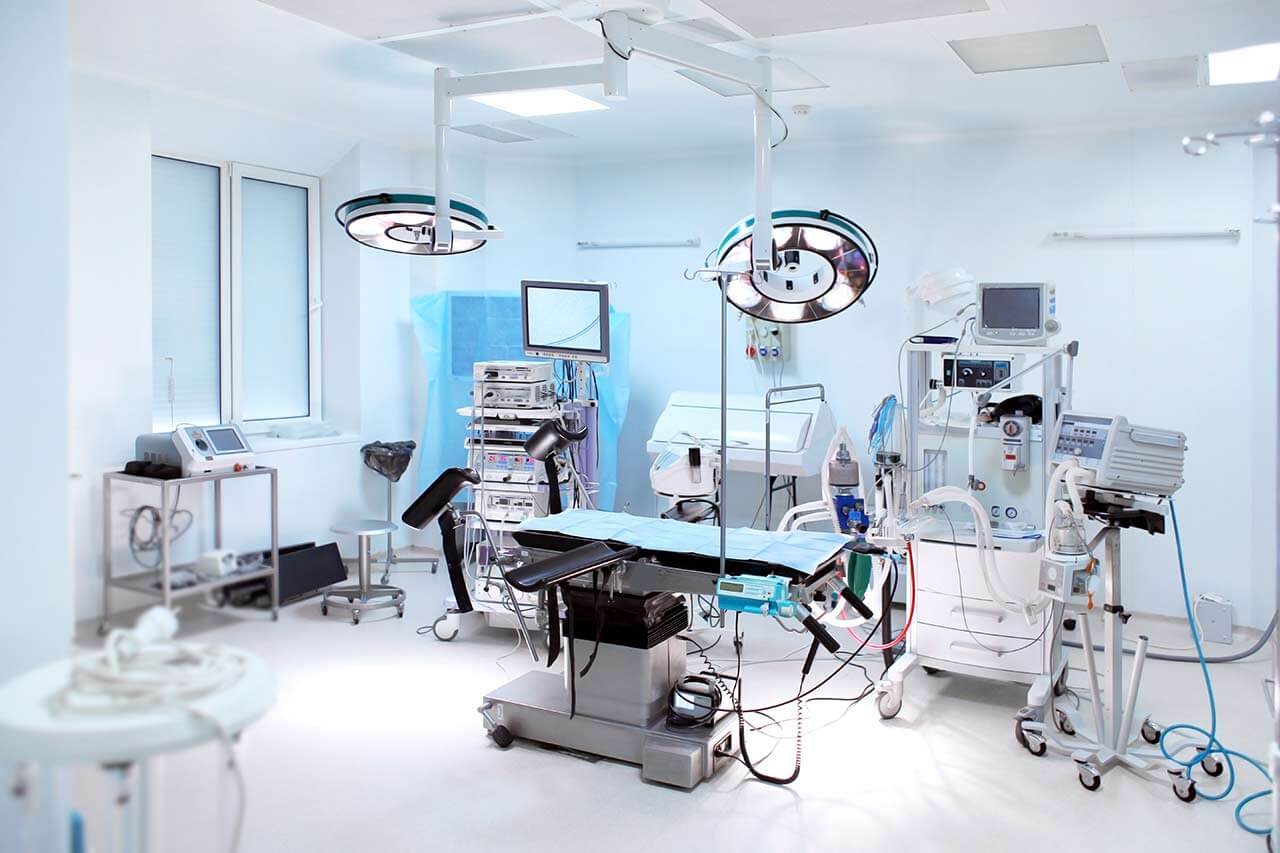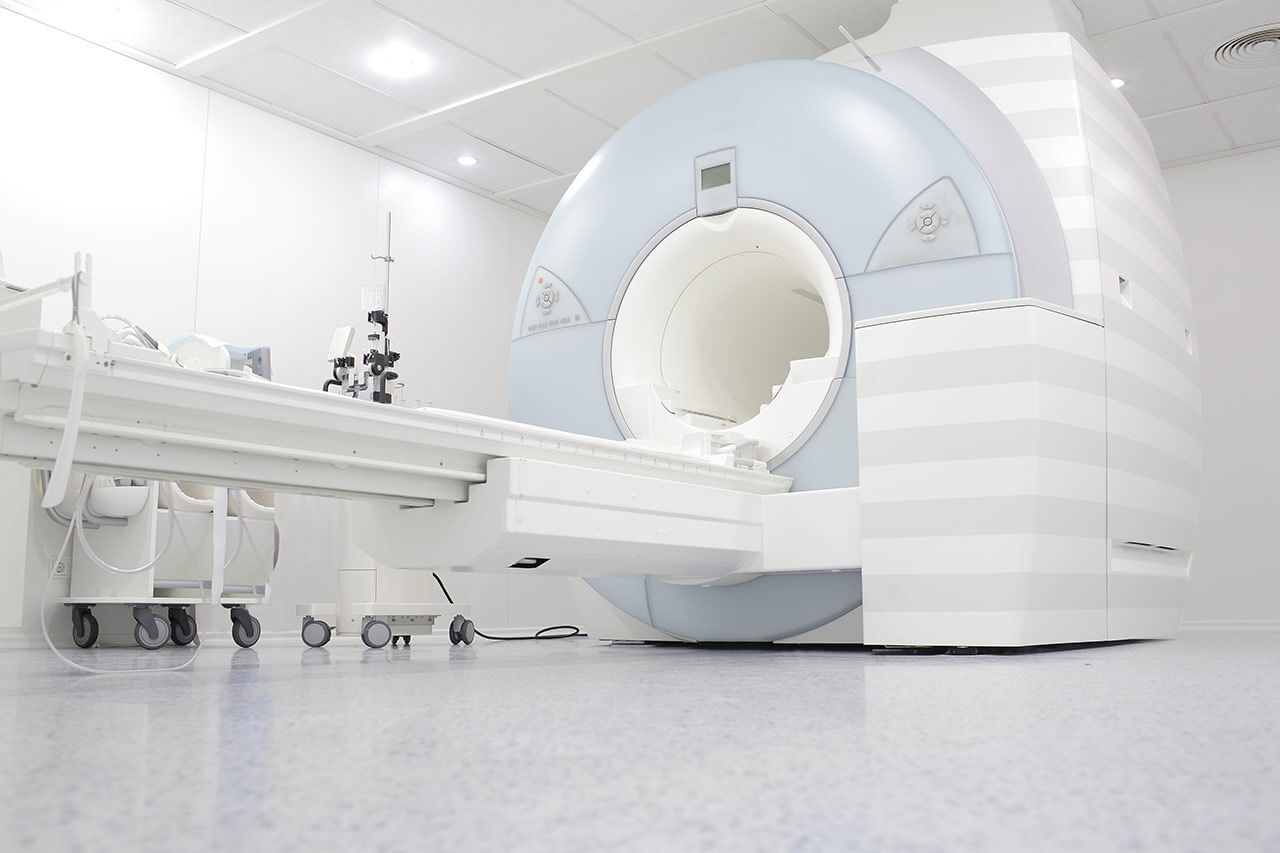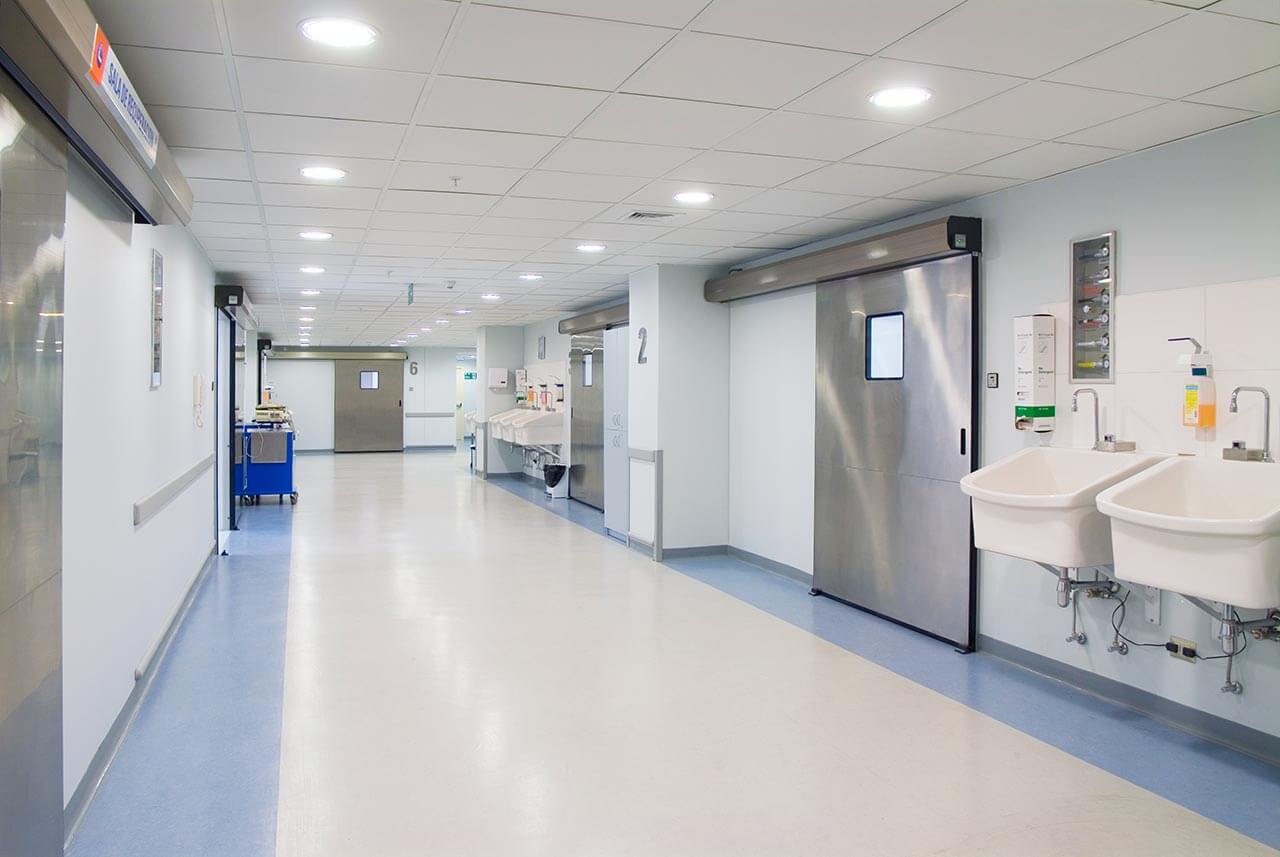
The program includes:
- Initial presentation in the clinic
- clinical history taking
- review of medical records
- physical examination
- laboratory tests:
- complete blood count
- tumor markers
- inflammation indicators (CRP, ESR)
- CT scan (on indication 650 €)
- MRI scan (on indication 1200 €)
- general otolaryngological examination
- laryngoscopy with biopsy (on indication 1200 €)
- histological and cytological examination (on indication 1000 €)
- nursing services
- tumor board involving
oncologist, radiologist, surgeon - consultation of the chief physician and all leading experts
- development of individual treatment plan
- written statement
Required documents
- Medical records
- MRI/CT scan (not older than 3 months)
- Biopsy results (if available)
Service
You may also book:
 BookingHealth Price from:
BookingHealth Price from:
About the department
The Department of Adult and Pediatric Otolaryngology, Head and Neck Surgery at the University Hospital Halle (Saale) provides a full range of modern diagnostic and treatment services in these medical fields, including high-quality medical care in phoniatrics and pedaudiology. The department provides consultations for all diseases of the ear, throat, and nose using progressive conservative and surgical treatment methods. Three highly specialized centers operate on the basis of the department: the Audiology Center (certified by the German Society for Audiology, DGA), the Head and Neck Cancer Center (certified by the German Cancer Society, DKG), and the Skull Base Surgery Center (certified by the German Society for Skull Base Surgery, GSB). An important area of the department's activity is cochlear implantation in adults and children, including rehabilitation and follow-up care after treatment for hearing impairment. In 2009, a specialized center was established where doctors perform cochlear implant surgery and surgery to implant bone-anchored hearing aids. This treatment is indicated for patients with severe hearing impairment that cannot be corrected with classic hearing aids. Many diagnostic and therapeutic procedures are performed in the department on an outpatient basis without hospitalization. The Head Physician of the department is Prof. Dr. med. Stefan Plontke.
The department has many years of clinical experience in the medical care of patients with head and neck tumors. In 2017, the department received the status of a Head and Neck Cancer Center certified by the German Cancer Society (DKG). The medical facility provides comprehensive treatment of benign and malignant tumors of the oral cavity, nasal cavity, paranasal sinuses, throat, larynx, salivary glands, lips, and skin of the face and neck. An interdisciplinary approach is used in the treatment, which makes it possible to take into account all the peculiarities of oncopathology and to choose the most effective methods. Treatment tactics are developed jointly by otolaryngologists, oral and maxillofacial surgeons, oncologists, and radiation therapists. The classic treatment regimen includes surgical tumor resection, chemotherapy, chemoradiation therapy, immunotherapy, and/or radiation therapy. The department's specialists work with the latest surgical techniques, which are characterized by a low trauma rate, while their effectiveness is comparable to the results of open surgery. Functional and aesthetic aspects are taken into account when planning the surgical procedure.
The department specializes in cochlear implantation in children and adults. A cochlear implant is an electronic device designed to restore hearing in people with severe to moderate hearing loss that cannot be corrected with conventional hearing aids. A cochlear implant consists of an internal and an external part. The external part is a processor that captures environmental sounds and converts them into digital signals that are transmitted to the internal implant via a magnet and a coil placed on the scalp. The internal part is the cochlear implant itself, which is surgically implanted into the cochlea, stimulating the auditory nerve and sending signals to the brain; the auditory centers of the cerebral cortex interpret the signals, allowing the patient to hear and understand speech and environmental sounds. The duration of the cochlear implant surgery is 1-2 hours. The surgery is performed under general anesthesia. The first stage of the surgery is to make an incision in the skin behind the ear where the inner part of the cochlear implant is placed. The second stage of the surgery involves creating a cavity in the bone structures of the skull where the implant will be placed, and opening the inner ear to insert electrodes that will interact with the auditory nerve. The culmination of the surgery is to check the proper functioning of the implant, after which the surgical wound is sutured and a sterile bandage is applied. After the operation, the patient undergoes a special rehabilitation program aimed at the individual adjustment of the cochlear implant audio processor.
The department is also competent to perform surgery to implant bone-anchored hearing aids. The most popular of these is the Soundbridge device, the implantation of which is indicated for patients with mild to severe sensorineural hearing loss, as well as conductive or mixed hearing loss. Unlike classic hearing aids that amplify sound, the Soundbridge transmits sound directly into the ear. The Soundbridge hearing implant surgery is performed under general anesthesia through an incision behind the ear.
The main areas of clinical practice in the department include the following:
- Conservative and surgical treatment of head and neck malignancies
- Hearing improvement microsurgical procedures on the ear for chronic inflammatory processes and laser procedures for otosclerosis
- Cochlear implantation for severe hearing loss, including subsequent rehabilitation treatment
- Surgery to implant bone-anchored hearing aids
- Middle ear surgery for Meniere's disease and semicircular canal dehiscence syndrome
- Laser surgery for tumors of the oral cavity, nasal cavity, neck, and throat
- Navigation-assisted skull base surgery
- Microscopic and endoscopic procedures for pathologies of the nasal cavity and maxillary sinuses using navigation systems
- Facial plastic and aesthetic surgery: rhinoplasty, otoplasty, and facelift
- Conservative and surgical treatment of head and neck injuries of varying severity, including skull base surgery
- Conservative and surgical treatment of snoring and sleep-related breathing disorders
- Conservative and surgical treatment of functional and pathological changes in the nasal cavity
- Conservative and surgical treatment of infectious ENT diseases
- Conservative treatment of allergic diseases
- Conservative treatment of balance disorders
- Conservative treatment of speech and voice disorders
- Conservative and surgical treatment of hearing impairment in children
- Other medical services
Curriculum vitae
Prof. Dr. med. Stefan Plontke is the Head Physician of the Department of Adult and Paediatric Otolaryngology, Head and Neck Surgery at the University Hospital of Halle (Saale). He graduated from the Humboldt University of Berlin, cum laude (1990 - 1997). From 1995 to 1996, he also studied medicine at the University of Pennsylvania, USA. From 1999 to 2003, he worked as an Assistant Physician in the Department of Otolaryngology at the University Hospital Tuebingen and conducted research as a Group Leader at the Hearing Research Center Tuebingen (THRC). He was appointed Senior Physician of the department in 2005 and defended his doctoral dissertation (2006). Prof. Plontke is a reviewer for various medical journals and has received several awards for his professional activities. He has been working at the University Hospital Halle (Saale) since 2010. Prof. Plontke was a Member of the Board of Directors of the German Society of Oto-Rhino-Laryngology, Head and Neck Surgery (DGHNO-KHC) for more than 9 years and served as its President from 2020 to 2021.
Photo of the doctor: (c) Universitätsklinikum Halle (Saale)
About hospital
According to the prestigious Focus magazine, the University Hospital Halle (Saale) is one of the best medical institutions in Germany!
The history of the hospital goes back more than 300 years, and during this time it has managed to gain an excellent reputation not only in Germany, but also throughout the world. The hospital positions itself as a specialized healthcare facility for the treatment of severe and rare diseases and injuries. The hospital provides medical care to patients of all ages in compliance with the latest scientific achievements. The hospital is distinguished by successful research activities, especially in the field of cardiovascular diseases and oncopathologies – the specialists in these areas have made significant contributions to the development of the very latest diagnostic methods and therapeutic approaches.
The University Hospital Halle (Saale) has 30 specialized departments representing almost all areas of modern medicine, as well as 17 narrowly focused institutes. About 35,000 patients receive qualified medical care of European standards in the hospital every year, and more than 212,000 patients are served on an outpatient basis. This number of patients is evidence of the high efficiency of medical services and the excellent image of the hospital in the international medical arena; patients from all over the world regularly seek medical attention here.
Some of the hospital's structural units deserve special attention. For example, the Central Emergency Department (the largest in Saxony-Anhalt), modern dental clinics, the Perinatal Center, and the Transplant Center, which has a history of more than 40 years. The Transplant Center performs more than 40 kidney transplants annually, most of them from living donors.
Thanks to the use of the latest medical technologies and the availability of state-of-the-art equipment, many previously high-risk surgeries and procedures can now be performed in the hospital using sparing techniques. In this context, hybrid cardiac surgery and robotic surgery using the innovative da Vinci Si® system in urology are worthy of mention.
An integral part of the successful clinical practice of the University Hospital Halle (Saale) is the availability of experienced and competent medical staff. The total number of employees at the hospital is more than 4,450. Many physicians are known far beyond the borders of Germany: they regularly conduct important research that enables the development of modern medicine. In addition, the hospital specializes in training medical students, so qualified doctors and professors are willing to pass on their experience to the younger generation.
The hospital has many quality certificates such as DIN EN ISO 9001:2015 certificate, German Cancer Society (DKG) certificate, JACIE certificate, EndoCert certificate, ClarCert certificate, German Spine Society (DWG) certificate, German Trauma Society (DGU) certificate, CERT iQ certificate, LGA InterCetert certificate, and others.
Photo: (с) depositphotos
Accommodation in hospital
Patients rooms
The patients of the University Hospital Halle (Saale) stay in comfortable single, double, and triple rooms with a modern design. All patient rooms have an ensuite bathroom with a toilet and a shower. The standard patient room includes a comfortable automatically adjustable bed, a bedside table, a wardrobe, a table and chairs for receiving visitors, a TV, a radio, and a telephone. The patient rooms have access to Wi-Fi. For safety reasons, the use of laptops and cell phones is prohibited in some areas, including the intensive care units. The hospital also offers enhanced-comfort patient rooms.
Meals and Menus
The hospital offers delicious and well-balanced meals three times a day: breakfast, lunch, and dinner. Patients and their companions can choose from three daily menus, which always include dietary dishes. If necessary, an individual menu can be prepared for the patient. Children are offered a special menu with healthy and tasty dishes, rich in nutrients necessary for a growing body.
Further details
Standard rooms include:
![]() Toilet
Toilet
![]() Shower
Shower
![]() Wi-Fi
Wi-Fi
![]() TV
TV
Religion
Religious services are available upon request.
Accompanying person
Your accompanying person may stay with you in your patient room or at the hotel of your choice during the inpatient program.
Hotel
Your accompanying person may stay with you in your patient room or at the hotel of your choice during the inpatient program.




